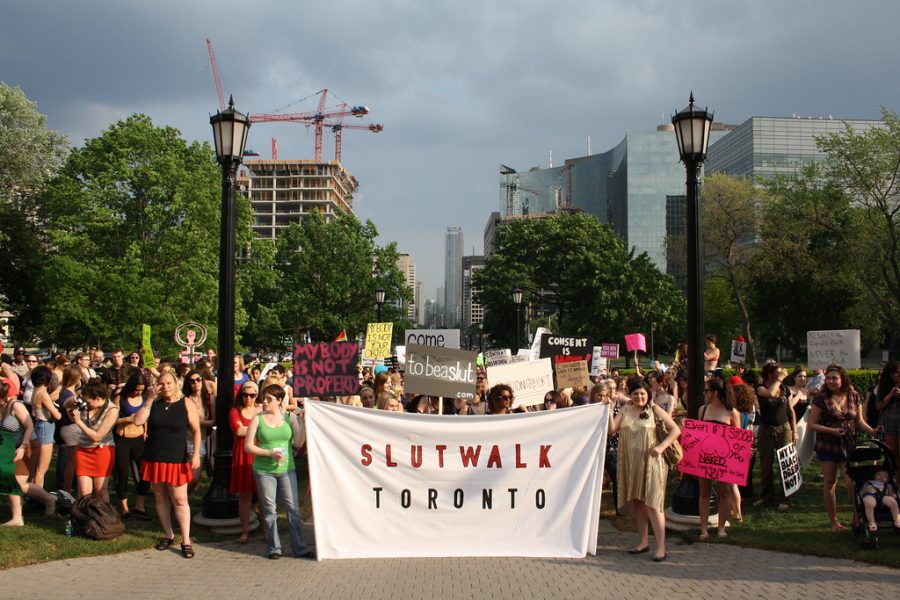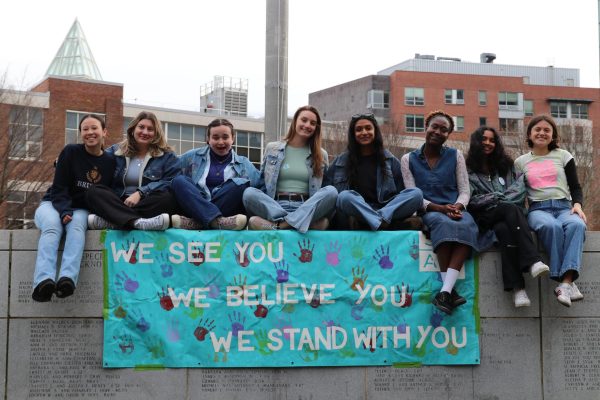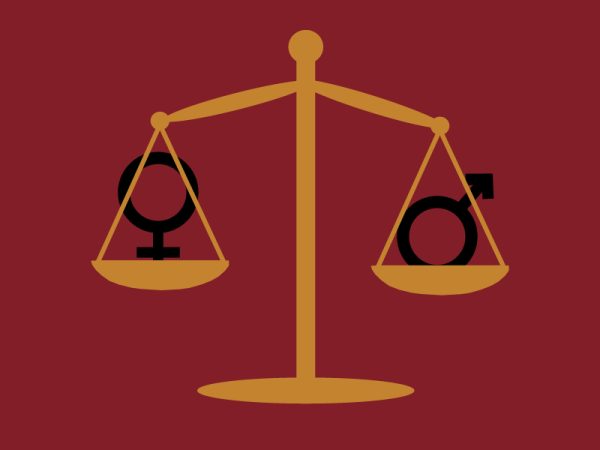Op-ed: Why I will never call myself a slut, even if it is meant to be empowering
"Slutwalk 2012" by lo.kwe is licensed under CC BY-SA 2.0
The ‘SlutWalk’ movement has reclaimed the term ‘slut,’ but this is not the way to go if we want to truly empower women.
February 25, 2021
“Women should avoid dressing like sluts.”
This statement, from a Toronto police officer, sparked the SlutWalk movement in 2011. The SlutWalk calls for an end to rape culture, victim blaming and slut shaming. The rallies consist of rightfully angry young women fighting to reclaim the term “slut” by dressing as provocatively as they want.
As a young feminist woman pursuing a minor in Women’s and Gender studies, you’d assume I’d be marching in a bra and fishnet tights along with my fellow “proud sluts.” But as much as I don’t condone attributing a woman’s rape to their clothing choices, I take issue with the notion that dressing in stereotypical “slutty” clothing is the solution to this problem. Instead, we should question why society feels it is okay to categorize women as sluts based on how they talk, dress or use their bodies. This type of language was created to further oppress women. I don’t want to embrace this terminology or “take it back” — I want to abolish it all together.
It has been three years since the #MeToo movement went viral on Twitter in response to sexual abuse allegations against powerful men. Women felt free to share their stories of rape and sexual assault, creating a community of solidarity without shame, guilt or self-hate. This movement gave women the space to bravely fight the unjust power imbalance between men and women in our culture. Courageous women risked public humiliation, their careers and their reputations so that the next generation could feel empowered to stand up to discrimination, sexual assault, rape culture and the objectification of women’s bodies. With that said, does walking around with a sign that says “Sluts have feelings too!” really help push the notion that women are in control of their sexuality?
I agree with the overall mission of the SlutWalk: To break free from the idea that a woman who dresses a certain way or is sexually promiscuous automatically means they are “asking for it.” But, I don’t feel that leaning into a term used by men to exert power over women is the most productive way to alter society’s stereotypes. Marching in skimpy clothing doesn’t address the underlying systemic and institutional issues that marginalize women nor the intersectionality of this problem. Like many other mainstream movements, race and class seem to be almost absent from the conversation.
The SlutWalk movement perpetuates the idea that women have to fit in the binary of sluts or prudes — as if there is no in between. However, the constant push to force women into categories so that society can make sense of their sexuality creates a false narrative. I don’t see myself as either a slut or a prude. But as a young and emerging feminist, the SlutWalk’s messaging led me to believe that it was “cool” and “powerful” to be a slut. This version of feminism is very limiting to young women who can’t — or don’t want to — characterize themselves and their sexuality in either of these categories.
The first use of the word “slut” was to describe “dirty women.” As time passed, the term was used by men as a way to absolve their inappropriate, violent and unwelcome sexual advances. The word “slut” “isn’t just an adjective. It’s a character.” A character that plays into the misogynistic “pure virgin” or “dirty slut” storyline. This word has been used time and time again to somehow excuse men’s unwanted sexual behavior against women. Feminists shouldn’t try to salvage a term that is utilized in cruel, sexist and even dangerous ways.
When the SlutWalk first started, it pushed boundaries and started conversations about how society views women. Now, almost 10 years after the movement’s conception, women are still gathering across the world to advocate for their right to dress and act freely without repercussions, adorning lingerie and sexy Halloween costumes while walking the streets.
In the #MeToo era, this feels confusing at best and counter-productive at worst. As women continue to press for the equality they deserve, every approach will have deficiencies. It is important to recognize the effective aspects of a movement while also acknowledging its frailty. The SlutWalk is a tangible confirmation that millions of women and men are fed up with the pervasive and normalized nature of rape, sexual assualt, slut shaming, violence and oppression against women. But it is also a spectacle of the media that frustratingly distracts from the more prevalent issues impacting women on a daily basis.
Calling myself a slut does not give me power. On the contrary, it feeds into society’s obsession with commenting on, judging, hating and using women’s bodies. Power and equality won’t be achieved by embracing the system, language and stereotypes that left us exploited in the first place — we must work towards constructive change by refusing to use words that hold women back.
Sydney Somerville is a third-year communications major. She can be reached at [email protected]


















